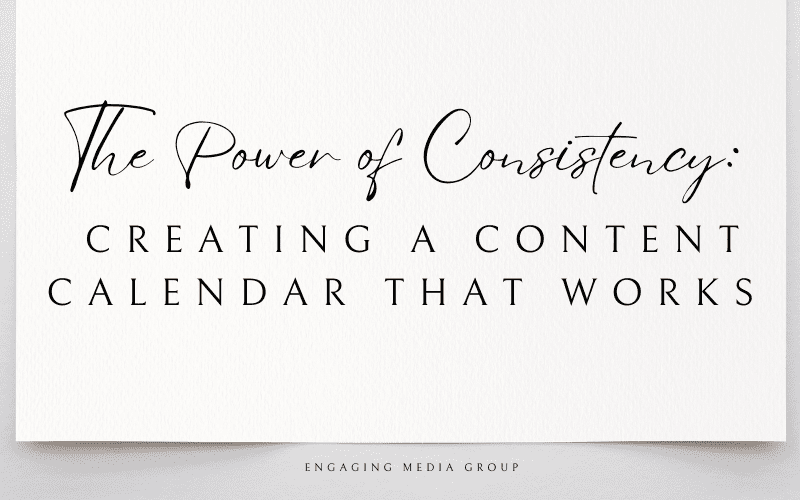Introduction
In the fast-paced digital landscape, businesses need to stand out in order to capture the attention of their target audience. One of the most effective ways to do this is by creating consistent, high-quality content. Whether it’s for social media, blogs, or emails, content is a major player in driving engagement and growth. However, simply creating content without a clear plan is not enough. A structured content calendar is crucial for achieving the kind of consistency that breeds results.
A content calendar not only ensures that you’re consistently putting out relevant content but also helps you stay organized, plan ahead, and align your content strategy with your business goals. In this blog post, we’ll explore the benefits of creating a content calendar and how it can drive success for your business.
1. Consistency Builds Trust and Authority
One of the biggest advantages of a content calendar is the ability to maintain consistency. Consistent content allows your brand to remain visible in your audience’s mind, making it easier for them to trust you as a reliable resource. Trust is built over time through frequent engagement and value. When your audience knows they can expect regular, valuable content from you, they are more likely to rely on your expertise.
By sticking to a content schedule, you can establish yourself or your business as an authority in your industry. Whether you’re publishing weekly blog posts, daily social media updates, or monthly newsletters, your audience will recognize you as a consistent, reliable source of information.
2. Improved Organization and Planning
A content calendar allows you to plan your content far in advance. It helps you organize your marketing efforts for the entire year or quarter, giving you ample time to brainstorm ideas, prepare content, and schedule posts. With a content calendar in place, you don’t have to scramble for content ideas at the last minute or worry about missing important events or holidays that could be relevant to your audience.
When content is planned ahead of time, it helps eliminate the stress and time crunch of coming up with ideas on the fly. With a clear content calendar, you can also easily track progress, ensuring that no important pieces of content are overlooked.
3. Aligning Content with Business Goals
A key benefit of using a content calendar is the ability to align your content with your business goals. By mapping out your content in advance, you can ensure that each piece of content contributes to your larger marketing strategy and objectives. For example, if one of your goals is to promote a new product or service, you can plan content around that product launch to create anticipation and excitement among your audience.
Having a structured plan allows you to stay focused and organized while keeping your content aligned with your overarching business objectives. This alignment increases the likelihood of achieving measurable results and staying on track with your growth goals.
4. Content Diversification
With a content calendar, you can ensure that your content is varied and appeals to a wide audience. You can plan a mix of content types—such as blog posts, videos, infographics, social media posts, and newsletters—so that you are constantly engaging your audience in different ways.
Diversifying your content also helps prevent burnout and keeps your audience interested. Instead of focusing on just one type of content, a content calendar allows you to experiment with new formats and topics that will keep things fresh and engaging for your followers.
5. Boosting SEO and Search Rankings
Another significant benefit of a content calendar is its ability to help boost your SEO efforts. When content is planned with SEO in mind, it’s easier to target specific keywords, write SEO-friendly copy, and publish content at a steady pace.
With regular, optimized content, search engines will recognize your website or blog as an authoritative source of information in your industry. A content calendar helps you track SEO goals and ensures that you’re covering all the necessary topics that will improve your search engine ranking.
6. Tracking Performance and Optimizing Strategy
Consistency not only applies to content creation, but also to content analysis. A content calendar makes it easier to track the performance of your content over time. You can monitor which posts are performing well and which need improvement, allowing you to make adjustments to your content strategy.
By looking at the data, you can optimize your content based on engagement rates, traffic, and conversion data. This continuous optimization ensures that you’re always improving and providing your audience with the content they love.
Additional Tips for Creating an Effective Content Calendar:
- Use Tools and Apps: Leverage tools like Trello, Asana, or Google Calendar to organize your content plan. These platforms allow you to easily visualize your content calendar and collaborate with your team.
- Plan for Flexibility: While planning is essential, it’s also important to leave room for spontaneity. Be prepared to adapt your content to current events, trending topics, or unexpected opportunities.
- Review Regularly: Set aside time each month to review your content calendar, making any necessary adjustments to ensure that your strategy remains aligned with your goals.
Conclusion
A content calendar is a powerful tool that can help streamline your marketing efforts, boost engagement, and keep you focused on your business objectives. By planning your content in advance, you’ll have more time to focus on creating high-quality, value-driven content for your audience.
Don’t let the challenges of content creation hold you back. Create a content calendar today and experience the benefits of consistency for yourself. Need help with your content strategy? Contact Engaging Media Group to get started on building a content plan that works!

